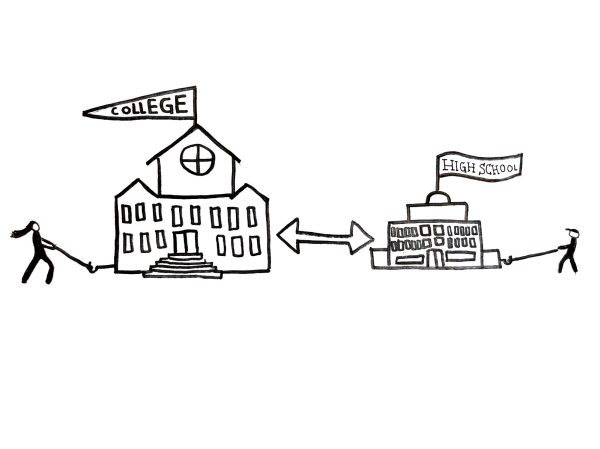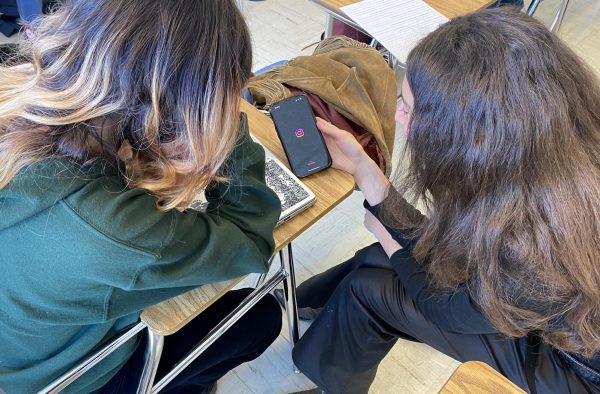Do AP Language Arts Classes Stifle Creativity?
The Advanced Placement Program is an intentional suffocation of creativity
With the exaggerated significance of AP tests, there has been a new trend of standardization sweeping through advanced English classes. A five on the exam can save thousands of dollars in college fees. After setting down nearly a hundred bucks to participate, it becomes even more imperative to pass; the responsibility falls on the teachers to imbue the skills necessary for their students to receive a good grade. But this movement has unintended consequences: it’s caused a flatline in student creativity.
The problem comes from the idea of “teaching to the test.” Sure, it’s helpful for the actual exam, but it also results in a flawed system and stays entirely dependent on something that will end in early May, leaving almost an entire month with no reason and no goal. Outside of the test is where the strategy fails. You can memorize a rubric, but how will it help you away from the class? The short answer is it won’t because it can’t. Though it seems cliche, the purpose of education is to prepare you for the real world. There’s no point if the whole semester is catered to a single formula that doesn’t have an application aside from an over-and-done-with exam.
In AP language arts classes, you’re taught to write inside a diagram. The prompts are rigid, and the rubrics have precise requirements for success; you’re given a blueprint and told to stick to it if you want to make the cut. Thinking outside the box is discouraged, and the result is mass-production, a standardization of ink and letters that gives rise to the same student copied several hundred times. There’s no variety and individuality when all that matters is how closely you can follow the pre-set parameters you’ve been handed. It’s a measure not of creativity but conformity.
The AP system encourages students to prioritize their grades over well-written essays. They’re taught not to understand but to regurgitate a recipe that’s been forced down their throats. You do something that sounds bad but fits the requirements, and then after the space of a few months, you forget what good writing looks like. If you make the mistake of being too unique, or clever, or artistic, or original, you’re rewarded with a low score and a newfound resolve not to stand out again. Instead of editing for word echoes or choosing a first-class sentence structure, you adhere to a standard, even with the knowledge your essay is worse in this form. And when you come to class, it’s not to learn but to prepare for a test that only holds its central relevance for the five hours it takes to complete it. A whole year is broken down into a single day.
On the other hand, the ability to express innovation or be yourself when operating inside a formula is a necessary skill. If done right, it can be just as creative as writing without a concrete outline. With time and practice, you can figure out how to craft outstanding essays while still meeting all the requirements. In the old AP test grading system, on a scale of 1-6, a rhetorical analysis piece could be awarded a 6+ for incredible sophistication; it was given if the examiner didn’t think they could do such a great article in the hour or so that was given. A 6+ was a mark of the ability to be imaginative within an innately unimaginative space.
When used to working without a blueprint, it can be stifling to be put inside a box. When used to working with one, it can feel just as suffocating not to have it. If students have cultivated the talent to express themselves the way they want to, whether or not the general subject interests them, they’ll be lost without a strict and concrete direction to take. “Hand me a topic; I’ll make something great of it. Hand me nothing, and I won’t know what to do.”
So abstraction can exist both within and without a recipe. Does that mean they should be teaching to the test and standardizing their students? No, definitely not, because creating carbon copies of the same person isn’t what teaching — or learning — is about. On top of that, it’s still limiting. Sure, you can get creative within the box, but you’re still stuck inside its confines, and at times if you’re too inventive, you don’t get the points because you’re considered to be breaking the formula. The AP system squashes individuality intending to prioritize compliance. It builds robots, not writers. One doesn’t become an English teacher to mold students into the same plastic model but rather to encourage their differences to flaunt what makes them unique. When everyone has their voice and style, it’s unfair to paint them monochrome.
It’s essential to know how to craft specific types of essays, and of course, different writing categories will have discrete requirements. You don’t approach a book the same way you approach a poem because their design is so distinct. There’s nothing wrong with classifications or with an independent basic form for each one; that said, the AP norm is strict enough to suffocate originality. When it comes to AP, there’s no such thing as a “general form,” just a rigid equation where you plug in variables like it’s a math class.
To be clear, the issue is with the regularity encouraged by the AP tests, not any specific teacher at BHS. They’re victims of the system that’s been put into place, just like the students. As a result of the national standard, they’re being made to do their best with what they have, which means they also need to get creative about getting the students creative within the box they’re forced to give to them. It’s a vicious cycle.
So if the students are harmed, and the teachers are harmed, who benefits from this format? The answer would be the College Board, the non-profit organization that runs both the SATs and the AP tests, along with many other examinations you’ve probably heard of. While it may be considered benevolent, the company has received criticism for several important things, including possible racial prejudice in score predictions, excessive fees, the sale of student data, and recycling SATs from other countries. The Board has also been denounced for the monopoly it holds; as one of the only companies that administer the kinds of exams necessary to get into college, it has leverage over millions of desperate students across the U.S. It, therefore, can charge far too much for each test. If you’re wondering how it benefits, being a non-profit, the Board has a history of violating this classification. Students are charged hundreds of dollars, and behind the scenes, the executives make six-figure salaries, and the CEO earned 1.3 million in 2009.
Another critical thing to note is that multiple educators have condemned the Board for the rigidity of its AP programs, which are highly restrictive but essential for college admissions. According to Les Perelman, the writing director at MIT, “[they’re] getting teachers to train students to be bad writers” by rewarding them for lengthy but terrible essays rather than praising the good ones. So if you’re tired of working with formulas or creating inside a box, you’re not alone; even the professors are done with the system.
You were wondering where this leaves you? The unfortunate answer is stuck. While specific colleges are switching to no longer require test scores, many of them still do; you’re trapped, and so you have to take the exams whether or not you hate them. You could shelve your creativity and resign yourself to a few years of writing with a blueprint. Or, you could fight. FairTest is an organization that opposes the extreme dependency on test scores in college admission processes. They’ve called out the Board for underestimating African-American students. Americans for Educational Testing Reform is a consumer rights organization that’s criticized the College Board for its shaky non-profit label. You can sign petitions, whether they’re to change admission requirements or directly to combat the Board. If you choose not to fight, that’s fine; sometimes, you have to look out for your interests, which means conforming to an unfair system if it helps you get ahead. But if you do, then best of luck in your endeavors. We’re rooting for you.

A senior at Boulder High, Tia developed her interest in journalism when she joined the newspaper club as a freshman. Over the course of her life, she’s cultivated a deep love of writing as an outlet and a stress-reliever, which lead her to participate in multiple literary classes, from Mythology to Creative Writing and finally, in her last year, Newspaper 1. In terms of her articles, she does not intend to focus on any particular topic but hopes she will be able to bring a fresh perspective to the paper.
Tia’s hobbies include hiking, kayaking, and reading, preferably while sitting on her porch. She is a volunteer at the Humane Society and spends two hours a week taking care...






